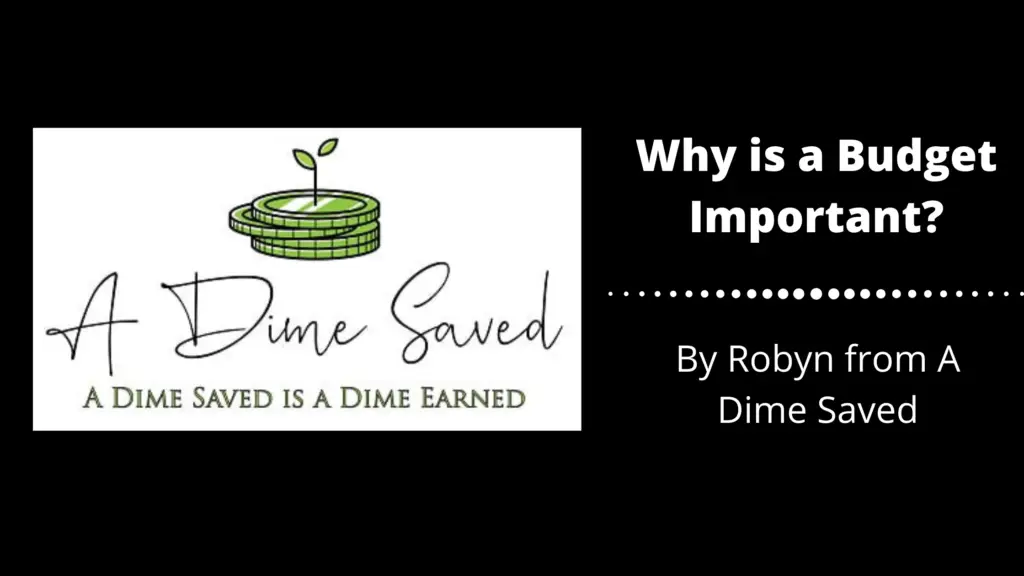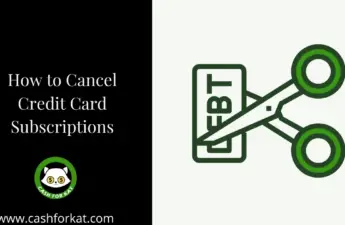
Today’s guest post on, “Why is a Budget Important”, was written by Robyn from A Dime Saved!
This is Cash for Kat’s 6th guest post! If you would like to start at the beginning, check out Zero to Full-Time Income by Kathrin from A Chat with Kat. Our last guest post was on How to Make a Personal Budget (& pay Down Debt) by Angela from The Coin Savvy Aunt.
Without further ado, here is everything you need to know about why budgets are important and how to find the best budget for you!
You need a budget, and I am going to convince you of that.
Having an accurate, written budget that works for you is the first step towards gaining financial stability and control. No amount of frugal living tips or money-saving challenges will help you if you don’t have an actual, workable budget in place.
If you are still on the fence about taking control of your financial life by budgeting, then I am here to convince you to start budgeting today:
A Budget is a Primary Tool for Personal Finance
A budget is one of the essential tools for personal finance. The first step in creating a better life for yourself and taking control of your finances is creating a budget.
Why? Creating a budget means that you decide where you want your money to go instead of waking up and wondering where your money went. Trying to be better with money without having a budget is like building something without a hammer. It’s the most basic tool in your toolbox.
You need a plan if you want to do well with money
Think about exercising: if you’re going to get physically fit, you can’t just start jumping up and down in your kitchen and hope you gain muscles. You need to do something. You need a plan. You need to have a routine that will help you get physically fit.
A budget does the same thing. You need a plan. You need a routine. You need to make sure that your money is going where it needs to go. Creating a budget is creating that plan.
Money is hard to control
Money is a funny thing. On the one hand, it is extremely important. You cannot do anything without money. You can’t live without money. On the other hand, spending money is addicting. It’s tough to control yourself around money all the time. Even though you know there are better ways to spend your money, it’s tough to do so.
There is a reason why so many people make poor choices when it comes to money- although money is simple and easy to understand, people struggle with control around money. Creating a budget gives you a framework that allows you to make proper choices and decisions- even (and especially) when you face temptation.
Budgets are Simple
There are many budgeting methods and many types of budgets, but they all come back to the same principle: deciding where your money goes. If it sounds simple, that is because it is!
Simply put, a budget is a list that tells you what you need to do with your money. First, you pay rent. Then you pay your bills. Then you buy food. Then you have fun.
A Budget gives you freedom.
Creating a budget gives you a framework that allows you to spend money where and when you want. It tells you the best way to spend your money and gives you the freedom to spend the rest of your money wherever it makes you the happiest.
So many people think budgeting is scary and terrifying. They believe that by budgeting, they will be giving up their freedom and become cheapskates. Nothing can be further than the truth! Budgeting is so freeing!
Since a budget is a framework to help you decide where to spend your money- you take a lot of the negative emotion surrounding money out of the picture. When you take all the emotions and decision-making away from every single purchase, then you allow yourself the freedom to spend or save your money as you want.
Mindful spending is only possible with a budget and the best way to appreciate your money and the choices you make.
Now that I have convinced you that budgets are IMPORTANT, where do you start? How do you create a budget?
There are many budgeting approaches and strategies that you can use. The most important thing is to find a budget that works for you.
Choosing a Budget
Choosing a budget that you want to follow is a good place to start. While you can probably figure out on your own the best way to budget your money, there are different budget frameworks that you can choose from. Here are three options to get you started.
50/30/20 Budget
The 50/30/20 Budget is a budget with just three categories, making it easier to stick to. It works like this: you spend 50% on needs, 30% on wants, and 20% on savings or debt payoff.
It makes you focus on the overall numbers and doesn’t get into the nitty-gritty of dozens of budget categories. A lot of people use this budgeting rule to get a hold of their spending without feeling deprived.
Zero-Based Budget
This budget was made famous by Dave Ramsey, and it is my favorite. It offers the most accurate estimate of what is coming in and what is going out.
The Zero-Based budget accounts for every dollar, and you make sure every dollar has a “place” before you even get it. This budget is probably the best to help prevent overspending. It is also commonly used with the Cash Envelope System.
Anti-Budget Budget
The “Anti-Budget” budget is best for people who don’t like budgets and have a fixed set of bills. Start by determining how much you make and calculate all of your expenses for the month.
Then determine how much you want to save/invest (pay yourself first). Whatever is left is your spending money for the month! If you spend less than what you accounted for, you can put it in another savings account, invest it for the long term, or blow it on whatever you want.
Creating a Good Budget
A budget is not a “set it and forget it” event. Instead, it is an ever-evolving practice. It may sound like a lot of work, but it will give a person confidence and even control their money.
Having a budget is one thing, but making it work for you is something else entirely. You can pick one and then decide to switch to another one. Nothing is set in stone. You are the only one who can determine what works for you and what doesn’t.
Choosing to create and stick to a budget and then following through with that decision is the best way to control your financial life and take concrete steps towards financial freedom.
Have you tried one of these budgeting methods? Which one is your favorite? Let us know in the comments section!
This guest post was written by Robyn from A Dime Saved, a blog dedicated to helping people get their finances in order so they can live the life they want to live!


2 thoughts on “Why is a Budget Important?”